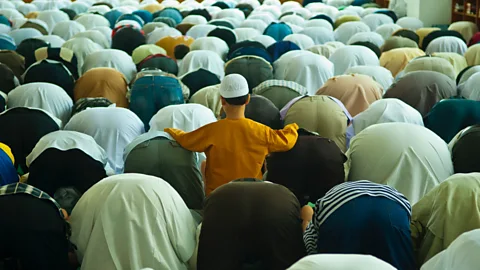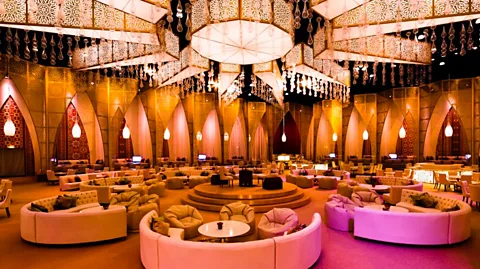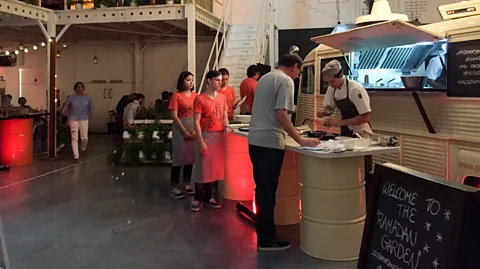Adapting to Dubai’s change of pace during Ramadan
 Getty Images
Getty ImagesFor four weeks every year life in the usually frenetic United Arab Emirates drops down a gear to mark the holy month of Ramadan, when Muslims fast during daylight hours.
This year, Ramadan, which moves forward each year according to the lunar calendar, has fallen at the height of a sweltering summer, when daytime temperatures regularly hit 45C (113F) and beyond and rarely dip below 30C (86F) at night.
Fasting is difficult at the best of times, let alone in such heat.
“It’s 15 hours of fasting, which is a long time, especially when it’s so hot, but after that first day, your body adapts and it’s not so bad,” explained Egyptian-Canadian Mahmoud Abul Ata.
“The first day is the hardest because you have to cut out everything at once, including coffee and for those who smoke, cigarettes, and you do get headaches, but actually it’s like a detox where you’re giving your body a rest from your usual eating habits.
During Ramadan, working hours are scaled back, with many public and private services shutting altogether in the afternoon. Nearly all restaurants and cafes close during the daytime, or offer takeaway from behind thick curtains as it is against the law to be seen eating, drinking or smoking in public, and night clubs and music venues shutter up for the month.
Expat exodus
To avoid the challenges of Ramadan during the summer heat, many of the UAE’s several million non-Muslim expatriates, especially those with young children, choose to leave the country altogether. As the school term ended last week, Dubai’s airports heaved with people making getaways.
One expat mother even pulled her eight-year-old daughter out of school early to return to their home in Canada for an extended summer break.
“We left because of the extreme heat, but also because it’s Ramadan,” the 40-year-old woman said. “I fully respect the Muslim culture but this is my first Ramadan and there are aspects that are very challenging.”
Not all depart, however, and for those expats who stay, Ramadan offers an opportunity to pause and learn more about the culture in the UAE.
Kelly Harvarde, a British PR consultant from Jersey in the UK Channel Islands, is spending her seventh Ramadan in Dubai.
“It’s the one time of the year when you might face a few restrictions, but rather than see it as that, I like to see it as a way to embrace the traditions of where I am living. We all choose to be here so we should also try and understand the culture too. At the end of the day, I’m not driving a taxi for 12 hours or working outside on a construction site, so I can’t really complain.”
 Jumeirah Group
Jumeirah GroupFor Irish expat and fitness instructor Roisin Thomas, Ramadan was an opportunity to join in solidarity with her Muslim clients. Fasting for the first time, she starts her day at 3:30 with a protein shake, sweet potatoes, eggs, and 1.5 litres of water. “I drink until my stomach feels swollen because I know I won’t be able to drink again for 15 hours,” she said. “The hardest bit is not drinking water and the first day was horrible not being able to have any caffeine, but my body is slowly adapting to the new routine. You feel tired, but you know food will come so it’s ok.”
When cultures collide
Still, fasting restrictions aren’t easy, both for non-Muslims who can’t eat and drink in public, as well as for those who are fasting but who have friends and colleagues who aren’t.
Abul Ata, who works at an energy company in Dubai, where around half the staff aren’t fasting, said: “At lunchtime you do smell food and it does tickle your tummy a bit, but my colleagues go into a closed off pantry to eat or close their office doors out of respect, so it’s not too bad.”
Stephen Hope, 39, a Dubai-based British office worker, said he liked Ramadan because it meant he had a proper breakfast at home and that he actually took a lunch break.
“Normally I grab a piece of fruit on the way out of the house and have sandwich at my desk but for one month a year, at lunchtime, I go into the kitchen and have a 10-minute pause.”
And he added: “If you time it right, there is a lot less traffic on the road and going to the mall on a Saturday morning is a much more pleasant experience because you can park more easily and the shops aren’t busy.”
However, shortened working hours can have a negative impact and companies both in the UAE — and those outside the country — need to be mindful of different work norms during this period. “If you’ve got public sector clients, you do have to structure your day a little differently because you’ll find many people do go offline in the afternoon, but otherwise it’s not really a problem,” Harvarde explained.
Traffic bottlenecks
Commuting during Ramadan in Dubai poses another challenge, with changed traffic patterns the most visible sign.
While for most of the day, usually clogged routes are refreshingly clear, roads can get hairy between 13:00 and 14:00 (when most public sector workers are going home), and in the hour before Iftar (the meal to break the fast at sunset) due to the number of tired and irritable drivers with low-blood-sugar levels.
“It is hard,” admitted Abul Ata, who drives more than 100km (62miles) from his home in Abu Dhabi to his office every day. “I do get sleepy, especially when I’m going home, but I turn up the radio and try my best to keep awake.”
A nightly re-awakening
But as sleepy as Dubai is during the day, the city comes alive after sunset when people break their fast and come together in large groups to celebrate at home or in restaurants.
 Louise Redvers
Louise RedversCrowds flock back to Dubai’s numerous air-conditioned shopping malls, which stay open much later than usual, with some open until 2:00 and some eateries until 3:00 for Suhoor, the pre-dawn meal.
Venues that lose-out on daytime trade more than make up for it at night. Car showrooms do some of their briskest trade during Ramadan, thanks to special discounts and offers, with some staying open as late as 3:00 over the weekend.
Supermarkets also brim with shoppers stocking up on delicacies to entertain during the festivities, while shopping malls are full of festive Ramadan posters and sales signs.
Hotels, who close many of their licensed venues during Ramadan, offer Iftar banquets instead, setting up traditional Bedouin style tents on air-conditioned terraces or host large groups in lavish ballroom settings. In fact nearly all restaurants, even those not selling Middle Eastern food, provide Iftar options and discount companies like Groupon offer handsome cut-price deals.
One of Dubai’s quirkier Iftars this year comes courtesy of Ghaf Kitchen, a local mobile-catering company that moved its trademark Citroen van indoors to create a pop-up Ramadan Garden in the city’s up-and-coming arts district, Alserkal Avenue.
With stars on the ceiling, lots of green plants and long trestle tables ideal for larger groups, the Ramadan Garden simulates al fresco summer eating, but with the comfort of air-conditioning.
“The Ramadan Garden is a modern and playful take on tradition,” David O’Brien, director of Ghaf Group said. “We wanted somewhere bright and vibrant for people to enjoy great food and break their fast together.”
At the end of the day, Ramadan is a time of reflection. “It’s a very spiritual time and a chance to remind yourself about people who are less fortunate and who have to go for long periods without food every day,” explained Abul Ata. “We use it to teach our children that you can’t have everything you want all the time.”
